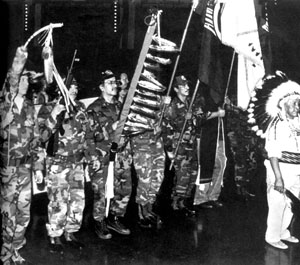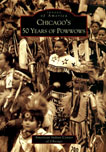<Adapted
from the book of the same name>
Types
of Powwow Songs
| A Chicago community
elder says, "Sing these songs in a good way . . .
always sing them to the best of your ability because the
people are listening. " |
FLAG SONG
Just as the United States has its national anthem, almost every
tribal nation has its own flag song, which is sung after the
Grand Entry. The flag song is sung to honor the Eagle Feather
Staff and respective colors and should be recognized with proper
respect.
CONTEST SONGS
Contest songs are composed to test the dancers' skill. They often
speed up or suddenly stop at unexpected times in order for judges
to determine the champion dancer. Contest songs are usually written
for a particular dance style, such as Fancy, Grass, or jingle
Dress.
INTERTRIBAL
The most common form of song is the intertribal or
friendship song. Everyone is to dance to these songs. Intertribal
songs are performed throughout the duration of the powwow to get
everyone on their feet and dancing.
VETERAN SONGS
Songs have been written for veterans of
World War I, World War II, Korea, Vietnam, and Desert Storm.
Respective tribal nations have their own veteran songs. When
a veteran
song is sung, it is customary to stand and men remove their
hats in reverence for those who served their country.
|
 |
TWO STEP (OR RABBIT DANCE SONGS
This is one of the few dances where
men and women dance as partners. Women choose their partners.
Couples, holding hands, circle the Drum and follow the lead of
the head dancers.
QUITTING (OR TRAVELING) SONGS
It is custom at the end of a powwow
to close the dance with a quitting song. Quitting or traveling
songs are sung to ensure everyone safe travel home.
Forward to the next page of this essay
Back to the previous page of this essay
Back to the Menu Page for this essay
Back to Online Essays
|
The book Chicago's Fifty
Years of Powwow has many more photos and offers insights
that are not presented in this Online Essay. To obtain a copy
of your own, follow this offsite link to the webpage for the Chicago
American Indian Center. |
|




